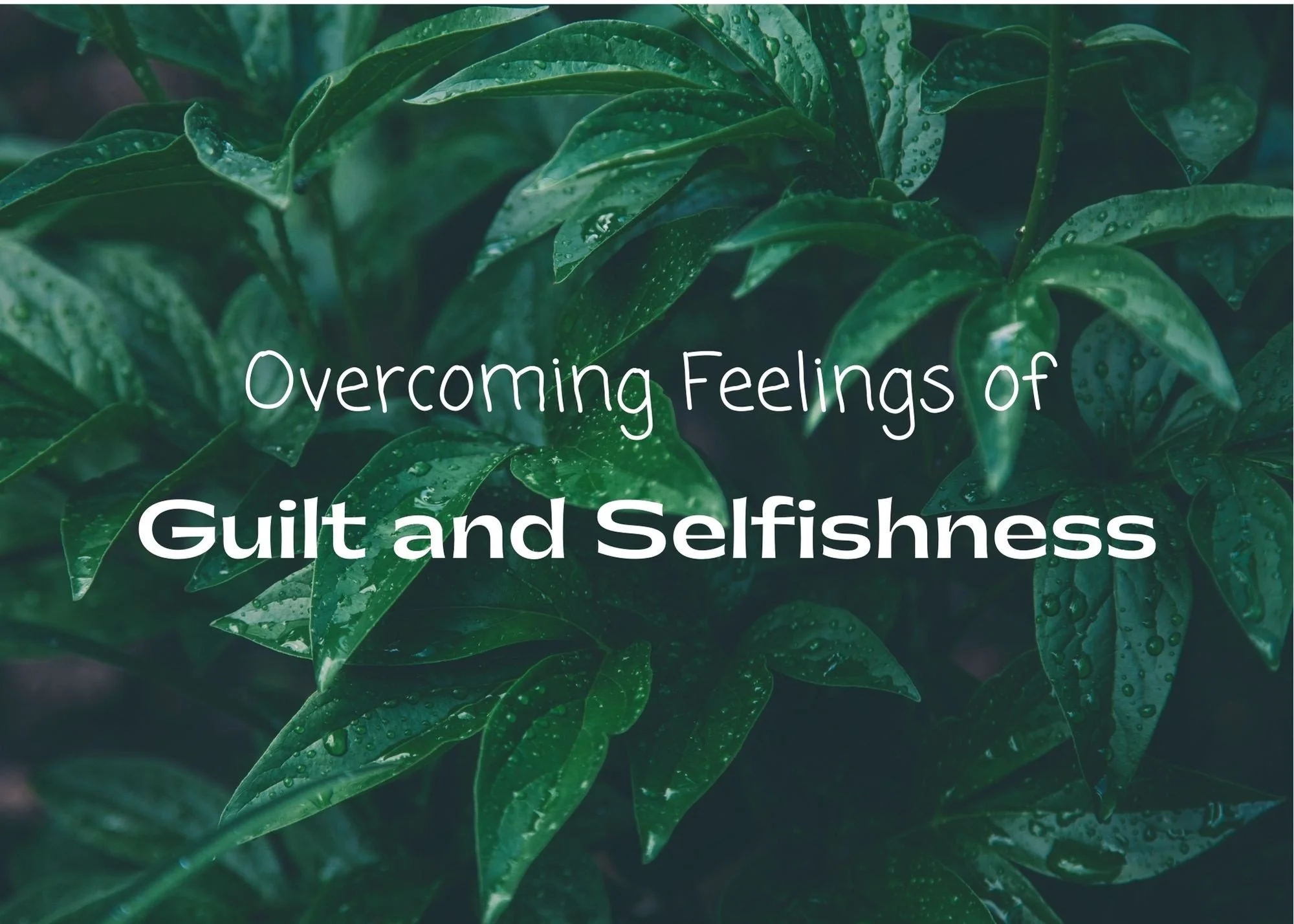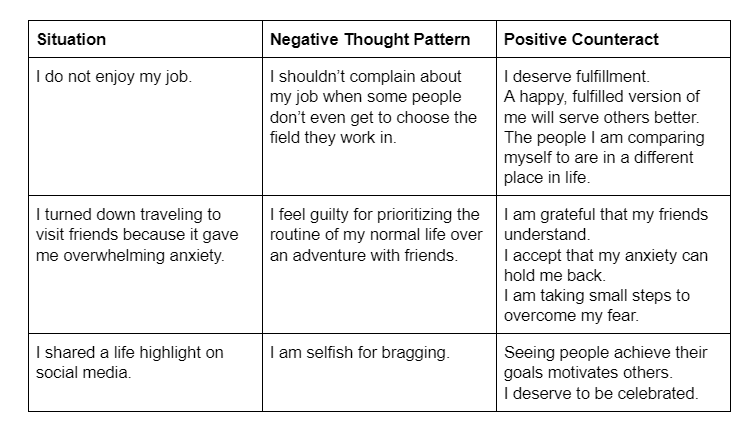Overcoming Feelings of Guilt and Selfishness
As an empath, I am able to easily feel what others are feeling. For example, when I hear the excitement and pride in my best friend’s voice after scoring an impressive sale through her plant propagating business, I feel it too. My heart jumps as if I were the one who just earned hundreds of dollars. Likewise, when a homeless individual with withered skin from standing in the sun asks, “Do you have any spare change?” my heart drops. I feel an instance of hopelessness as if I were the one who didn’t know where my next meal was coming from.
I know I have the ability to feel compassion and empathy. Why, then, can I still not hand over the spare change and instead go to my safe, comfortable home to work on the small business I am privileged enough to start?
Overcoming Guilt: We're all on a spectrum.
I haven’t yet managed to balance having compassion for others, gratitude for what I have, recognition of my privilege, and the drive to continue pursuing happiness for myself without feeling guilty. Let’s take last week’s blog post, for example. I essentially complained about not feeling fulfilled by a job that gives me a salary, vacation, and benefits. I said it wasn’t enough for me, so I’m going to use the laptop I'm lucky enough to afford to pursue something greater, like starting an online business. I get to complain about my job, but some people will never even have the opportunity to have a job at all. Viewing my last post through this lens floods me with guilt. I recognize the self-regard I must possess.
But I can also view this through the opposite end of the spectrum. The other side of this perspective says that everything is relative. We can always compare ourselves to others. Things could be much worse, but things could be much better.
Since I am presented with an opportunity and feel unsatisfied with my current situation, why wouldn’t I take advantage of that opportunity to increase my happiness? Is it selfish to pursue bigger and better things when I could just accept what I have and be perfectly safe and comfortable?
Maslow's Hierarchy of Needs
Sometimes I feel pretty selfish for pursuing self-fulfillment when the town next door is full of individuals who might not receive three meals every day. When this particular guilt consumes me, I consider Maslow’s Hierarchy of Needs. This theory depicts human needs in a five-tier pyramid, laid out below. We can pretend the Dalai Lama is at the top and a starving, malnourished person is at the bottom.
The theory suggests that humans cannot move to a higher level on the pyramid before satisfying the lower level. For example, if a person doesn’t feel safe, they are unlikely to be concerned about finding meaningful relationships because a lack of security is more pressing.
At the moment, I find myself somewhere within Esteem, attempting to achieve Self-Actualization. However, two years ago, I was too worried about finding intimacy to focus on the two higher levels. People may fluctuate between stages depending on life events, but we can recognize which level we are focused on at present. We can have acceptance for whichever needs we are working to satisfy and be okay with the fact that others might be in a different place.
We are programmed to become the best we can be with what we are given. People strive to climb the ladder to achieve self-actualization if they can secure the four pillars below. It is human nature to always want to achieve a higher state of well-being, and we don’t need to feel guilty or selfish for being human.
Overcoming Selfishness: Unlearn the negative connotation.
Being selfish means you are concerned with your personal pleasure over others’. The negative connotation behind selfishness exists for a reason, but there is a spectrum. Selfishness isn’t always a negative thing.
Just yesterday, I whined, “Why do I deserve to start my own business when that guy we met today has been unemployed for months?”.
My boyfriend replied, “Jessi, you know if a person is completely selfless, they’ll literally die. ‘I won’t eat this week; you can have all my food instead.’”
This dramatic example reminded me that selfishness serves a purpose. We must take care of ourselves first.
In airplanes, the flight attendants tell everyone that if passengers must put on an oxygen mask at any point during the flight, guardians must put on their own mask before putting it on their child. This type of selfishness ensures that adults don’t pass out from a lack of oxygen before the child can put the mask on. If the child cannot do it themselves, how helpful is an unconscious guardian?
Self care heals more than just you.
Can you remember a time when you neglected your own happiness or well-being to accommodate another? Every mother I’ve ever met sure can. Every mom has reached a point where they’ve done so much for their children that they have no remaining energy to spend on themselves. They’ve sacrificed grabbing drinks with friends for months because they’re too busy pouring all of their time into getting their kids to appointments and making sure the new puppy doesn’t pee in the house.
When this personal sacrifice goes on for too long, the mother snaps. The result isn’t the recipe for a "happy family." Instead, a boiling argument erupts or a batch of depression ensues. Selflessness should absolutely be practiced, but we can’t forget to care for ourselves in the process. We can’t serve from an empty vessel.
Therefore, self care can actually be thought of as a selfless act. If you are fulfilling your own needs, you’ll be in a happier and healthier state that is more capable of helping others. People want to see the best version of you, who is in high spirits and pleasant to be around. By taking advantage of opportunities and pursuing goals that feed your happiness, you are sharing a greater version of yourself with others. You don’t need to feel guilty for taking action to reduce your own negative emotions because people will get to experience a happier you with greater potential.
Learn how to stop negative thought patterns with gratitude.
When battling feelings of guilt and selfishness, practicing gratitude can return you to a balanced state. For instance, instead of wallowing in your shame from saying no to hanging out with a friend because you’d rather read a book in a bubble bath, focus on how grateful you are that you have a friend who understands, warm water to fill your tub, and a novel that is so captivating you can’t stop reading.
Below, I’ve laid out personal examples of situations that have caused strong feelings of guilt and selfishness within me. Next to them, I’ve counteracted the negative thought patterns with gratitude, acceptance, and positive affirmations.
As I practice transforming those negative thought patterns into positive ones, habits form. Positive habit formation will lead to an increase in self-confidence, decisiveness, and contentment. If you can let go of the feelings of guilt and selfishness while still balancing gratitude and compassion for others, imagine what you can accomplish!
Mental Health Blog Disclaimer
I am not a medical professional, therapist, or mental healthcare professional. The information provided on this website is for informational purposes only, comes from my own personal experiences, and may be read, interpreted, and practiced at your own risk. Do not rely on this information as a substitute to medical advice or treatment from a healthcare professional.





Hi! I’m Jessi, the author of this blog post. I write authentically about about adventuring, healing, and my writing journey.